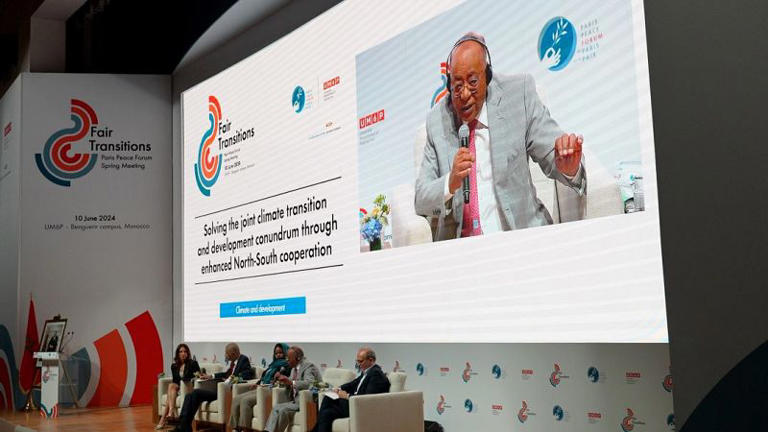It was at the Mohamed VI Polytechnic University in Benguerir, Morocco, that global governance actors gathered for the Spring Meeting of the Paris Peace Forum.
A Paris forum in an African country is not only a first but also a symbol of the common interests between the North and the South, and of Africa’s essential role in providing solutions to global challenges.
“For us, technologies are not local; technology exists globally. Innovations and the adaptation of technology to local realities are what’s local. But technology itself is global,” explains Hicham El Habti, President of Mohammed VI Polytechnic University (UM6P).
“The young researchers you saw yesterday, when they work on technology, their horizon is the world, not just Morocco or Africa. That’s the motto of UM6P, truly ‘Empowering minds,’ to develop sovereign technologies on the African continent, but to address global challenges.”
This year’s theme is fair transitions, as countries face the dilemma of reconciling environmental preservation with reducing the energy gap.
Nisreen Elsaim is the general coordinator of the “Youth and Environment Society (YES)” platform and former Chair of the UN Secretary-General’s Youth Advisory Group on Climate Change. For the young environmental activist, it’s impossible to talk about transition without addressing the issue of equality.
“Only 40% of the African population has access to electricity. Without access to electricity, there is no access to health, education, or industry… So what kind of transition are we talking about?” she exclaims. “It’s just a question of access.
Our citizens must understand that they have the right to access electricity, energy, quality education, health… and then they will be able to develop themselves and their communities.
It’s only when we are in a position of equality that we can talk about what is fair and what is not.”
But how can we finance a fair energy transition and attract investors to Africa? For Amadou Hott, Special Envoy of the President of the African Development Bank, collaboration is essential.
“The public sector, private sector, and philanthropists, everyone needs to work together. African governments will have to continue investing in infrastructure, especially energy, to provide access—it’s a priority. But the private sector also needs to be able to invest because there is money to be made.”
Organized in collaboration with the Mo Ibrahim Foundation, the forum concluded with the launch of ATLAS (Agricultural Transitions Lab for African Solutions), a permanent platform for political dialogue and collaboration between Northern countries on one hand, and Africa and Southern countries on the other.
